
“In Bell Case, Black New Yorkers See Nuances That Temper Rage,” said the April 27 headline in The New York Times, two days after the judge’s verdict that acquitted three detectives charged in the shooting of Sean Bell on Nov. 25, 2006. The night Bell was killed, he had been at a club celebrating because he was being married the next day.
If the public reactions to the verdict were muted and restrained, instead of the violence that might have broken out over what some felt was a wrong decision, the calm in the community was as much for the intervention of A.R. Bernard as other factors. He has spent much of his personal and public life building relationships and bridges to others in making change happen for the good of his community.
A month before the Bell decision, Church Executive interviewed him and he spoke about using influence in the public sphere. On that 2006 morning, he recalls:
“I got a call from the Mayor and there were clergymen and political leaders who were willing to use their power to stir up the community to violence. So we were called together at an emergency meeting with the Mayor and police commissioner.
“We all sat at the table, including one of the representatives of the family, Al Sharpton and some other leaders, and it was in that kind of intense heated situation that the Mayor looked to me for advice. I shared counsel and he agreed, the commissioner agreed, and basically everyone agreed that that counsel made the difference as to whether we would have had riots, very violent riots here in New York City as the result of this.
“Government is people,” he says. “If you can influence people you can influence government. You do what Jesus did. He went around building relationships, and through those relationships you can influence what goes on. We’ve been able to do that.”
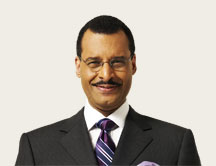 He’s on his city’s Economic Development Corporation board, helping provide subsidized, affordable housing, and Bernard served on Mayor Michael Bloomberg’s transition team, helping to decide who the commissioners of human rights, aging and immigration would be.
He’s on his city’s Economic Development Corporation board, helping provide subsidized, affordable housing, and Bernard served on Mayor Michael Bloomberg’s transition team, helping to decide who the commissioners of human rights, aging and immigration would be.
Until the Mayor took himself out of contention in the presidential race, Bernard would have been there to work on the mayor’s behalf, regardless of political persuasion.
“I would have loved to be involved in some way,” Bernard says. “I have been blessed to develop a great relationship with Mike. We don’t agree on issues, but my philosophy has been to build relationships.”
In one place you’ve said “my desire is to effect change within society by representing the biblical world view and the biblical value system,” but you also work through the current political structure?
Absolutely.
Some people have a hard time with the church being in the world but not of the world?
But that’s a tension that we live in. Jesus sent us into this world; he did not tell us to create our own little Kingdom. If that were the case I wouldn’t be talking to you now as a pastor, as a Christian. It’s a fear. We’re the same people who quote, “greater is he that is in me than He that is in the world,” and yet we are terrified of that world that Jesus sent us into.
It is indeed a tension but I believe through the models of Joseph and Daniel, you can adjust to the culture without compromising your convictions. It takes a strong Christian to do that but that’s exactly what Jesus intended us to do, to go into the social institutions of education, politics, economics, arts and entertainment and the spiritual world.
People often find that a corrupting influence.
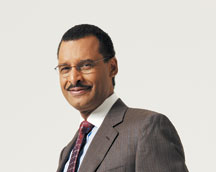 Well it depends on how solid you are. If that’s not something that you’re up to then by all means don’t do it. Too often as Christians we’re very critical of what’s happening in the world, but we’re not in there trying to change it.
Well it depends on how solid you are. If that’s not something that you’re up to then by all means don’t do it. Too often as Christians we’re very critical of what’s happening in the world, but we’re not in there trying to change it.
You have a community development organization, Christian Renaissance Corporation, of several churches, I take it, to establish urban revitalization. How entrepreneurial is the congregation in that way?
We have a very strong entrepreneurial spirit. We believe in faith first, family, education, and then entrepreneurialism as the way that we should think and pursue. So we empower people. We teach them, apart from dependency on God, self-reliance and personal development, which is a large part of what we do. So we modeled that in the church. Our campus has a sanctuary, a café, a restaurant; we get into business development and hold seminars that empower people so that they can get into their own businesses.
Was there a larger motivation?
In 1986 the whole notion of Christ’s relationship with culture became a challenge for me. I could not accept that God called us to remain in the four walls of the church. That whole commission — go into all the world, the social order, the institutions that compose society, and preach the Gospel — that challenged me deeply and coming from the Muslim influence I knew that both Judaism and Islam did not just bring with it a religion but a culture that was respected, especially here in the U.S., not just as a religious belief system but a culture; whereas Christianity was looked upon as a religion.
And I said, why? I said because we have not really promoted it as a Kingdom culture. So I began to take a look at the whole notion of Christ in culture. Richard Niebuhr’s work, Christ and Culture, examined the different relationships, the counter Christ, Christ above culture, in culture, against culture and all of that.
Niebuhr did not, however, really bring it to a conclusion; it was just an examination of different views. I believe very strongly in embracing our past, the creation, the fall, redemption, and the future. The consummation of the ages, the return of Christ, the establishment of his Kingdom on the earth. But my focus is in the present, the dynamic presence of God to transform society by transforming individuals, and that is the great emphasis that our ministry carries.
Is there something within the black church that is typically entrepreneurial?
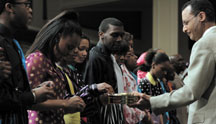 You’ve got to understand in the African American community the church has been central, the church has always been the promoter of faith, family and education. The church has been our platform; the preacher has been our voice. In a society where we did not have any rights or equality, in the church it was our place of equality. In the early days of slavery the black preacher was the educated individual in the community, the black preacher was the voice and representative and the prophet of the community.
You’ve got to understand in the African American community the church has been central, the church has always been the promoter of faith, family and education. The church has been our platform; the preacher has been our voice. In a society where we did not have any rights or equality, in the church it was our place of equality. In the early days of slavery the black preacher was the educated individual in the community, the black preacher was the voice and representative and the prophet of the community.
So the black church is still the largest influencer and shaper of the values of the black community. Where there was a disconnect was because blacks have always been conservative and family oriented. But our desire was not to become empowered and get involved in the political process.
Blacks could not see that within the Republican Party. So they gravitated to the Democratic Party and unfortunately the Democratic Party and black politicians who supported the party over the years began to take on very liberal points of view.
There became a disconnect between the values of the community that we still hold and what the political representatives were supporting in legislation.
That’s changing. Now the people are forcing the political representatives in the black community to become consistent with their values.
With all the honors you’ve received your bio on your church Web site says that you “remain unfazed, is pastoral by nature and does not view himself as a superstar nor a politician.”
You know, unfortunately, power can be very intoxicating and if you don’t have a fearful respect of whatever power God entrusts you with, you will end up abusing it. I think the number one virtue that protects me is a conscious need for humility. That’s not something that you just pray for and God magically anoints you. It’s an every day, humbling of yourself and not taking the arrogant road or the road of ego or pride as situations present themselves.
I have to say that that has been what has protected me over the years. Of course I have a wife at home reminding me everyday.
I know you’ve had a difficult period as a youth and young man?
I grew up in Bedford Stuyvesant and Bushwick in Brooklyn and we were Catholic so I attended the Catholic mass. But as I got involved with activities. I started attending different Protestant churches only to be a part of those activities.
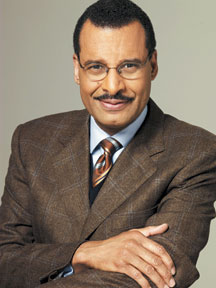 I became a part of the Methodist church so I could play ball. I didn’t go to church, didn’t know Christ, but I did attend for the sake of playing basketball. During the summer the Lutheran church around the corner from our home in Bushwick had a lot of programs through their vacation Bible programs, so I went and it kept me busy.
I became a part of the Methodist church so I could play ball. I didn’t go to church, didn’t know Christ, but I did attend for the sake of playing basketball. During the summer the Lutheran church around the corner from our home in Bushwick had a lot of programs through their vacation Bible programs, so I went and it kept me busy.
The 60s were turbulent while I was growing up so I was among those young black men trying to resolve that identity crisis.
The fact that my father was a white Spaniard and my mother was black, descendents of Africans, who were brought to Antigua and then migrated to Panama; it was a wrestling for me. It was at the height of the civil rights movement and turmoil in the country. I became a part of the desegregation program which bused me from Brooklyn to Queens as part of the desegregation of white schools.
So I was growing up very socially and politically conscious, and the group of individuals that I hung around was individuals that were looking forward to making change in the system. Growing up in those days for young African Americans, there were two icons — there was Malcolm X, although he had been assassinated at that point, and there was Dr. King, and we felt we had to choose between the two. Some chose Dr. King but most of us chose Malcolm because the Nation of Islam represented order, strength, sense of identity, sense of belonging, dignity — all those things that we did not experience as
African American young males growing up.
You made a choice about who to follow?
By 1970 I had made a determination that I would follow the teachings of Elisha Mohammed and attended the mosques.
From 1970 to 1975 I identified with the Nation of Islam, although I continued to search because I didn’t find God there. I found black unity, I found order, I found strength, but I didn’t find God.
In 1974 a young Pentecostal woman who came to work for me as my secretary began to talk to me about Jesus in a different way, in a way that I had never heard before. I challenged her and she really couldn’t answer a lot of the questions.
But what intrigued me was her child-like faith in this Jesus.
So finally, January 11, 1975 she invited me to a meeting where Nicky Cruz, a former member of the Mau Mau gang, was sharing his testimony. It was that night that everything came together and two things hit me deeply — number one, these words, “I am the God that you are looking for,” and intuitively I knew it was Jesus, and number two, “I am my Word of one” which immediately brought me to the credibility and validity of the Bible. And that’s where my whole new journey began to understand this Jesus.
During the time I was working at the bank, from 1970 to 1979 and after I got saved, all of my interests in finance died and I felt there was a greater purpose for my life. By 1978 I acknowledged it was time for me to do something else. So we established a little study group and a store front church based on the influences of the Pentecostal denomination that I went to once I got saved and that began to quickly grow. I left the bank at the end of 1979 and started a full-time ministry.
What’s the unhappiest time in your life when you were most challenged in your ministry? Everybody looks to you as a role model — this man’s never had a bad time in his life?
Absolutely not true. I would say that the most challenging time is when I committed the sin of transposition. When I fell out of God’s order and I put the ministry ahead of my family. That was in the mid-80s. Basically I put the ministry ahead of my wife and my relationship with her.
What turned you around?
I saw what was happening. I thought my wife began to resent the ministry but she was really resenting me because I had made the ministry my mistress.
I was at a meeting in Dallas, TX, at Prestonwood Baptist Church. Bill Weber was the pastor at the time and Dr. David Yougi Cho [of South Korea] was there and he shared his testimony how he went through the same crisis and it was like he was talking directly to me. That day was a critical turning point in my life and I had to reprioritize my life and ministry. God told me, he said, look two things — number one I didn’t die for your ministry, I died for you. When your personal walk with me is being jeopardized by this call and ministry, you’ve got your priorities out of whack.
Second thing he said, deepen your relationship with your wife and I’ll broaden your ministry. That was clear. I understood that I had to then take the time to undo all this stuff that I did. And it’s funny because the ministry continued to grow in spite of this crisis that I was in with my wife.
Happiness results from the way you choose to interpret events and the choices you make as a result of those interpretationss. Happiness depends on your willingness to lead a proposeful, principled life. And, of course, your happiness depends upon the nature and the quality of your relationship with God.
— from the Introduction
Happiness Is … : Simple Steps to a Life of Joy by A.R. Bernard (Touchstone Faith/Simon & Schuster, 2006)


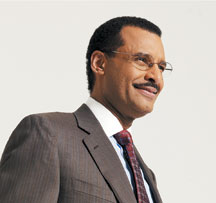

The article was very inspiring for me because I too went through my own transformation from Cathalosium to the Nation of Islam to Christ conciseness
i live at 2830 pitkin avenue and i wanted to know about affordable apartment in the church could you contact me in brooklyn ny if there are any christian building with vacancy in nyc.com
Pastor A R Bernard I enjoy your teachings